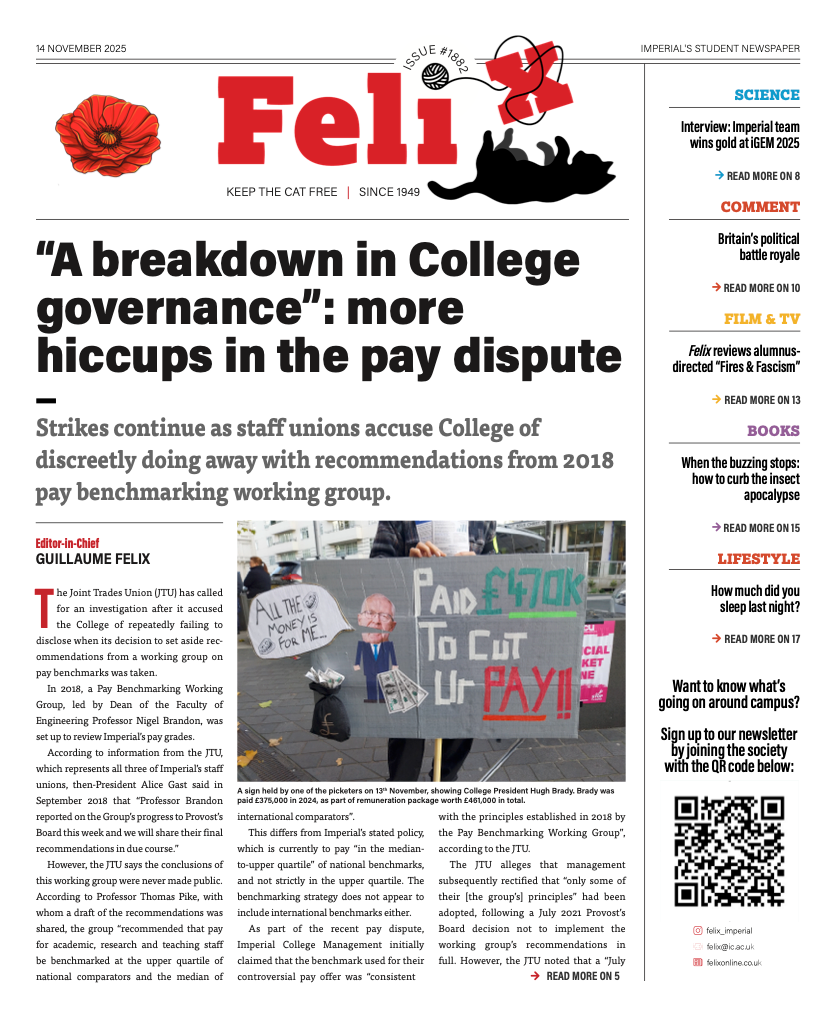Britain’s political Battle Royale
Comment writer Samya Banerjee takes a wry look at UK politics – eight parties, zero direction, and plenty of chaos.
Here in the wet and weary lands of this United Kingdom, there is a political earthquake poised to happen. The Conservatives, it’s fair to say, have had a tumultuous decade and a half dealing with the not-at-all seismic events of Brexit and Covid. Their 14-year reign finally ended in 2024 when Labour stormed into power, winning a whopping 63% of Parliament with just 33% of the vote. Now, in November 2025, we are in a very different world. The two main parties are in a position where they’re being usurped by outsiders amid a populist wave sweeping across Europe. With as many as eight viable parties contesting a single constituency, a party may now win with only 20% of the vote. Now, let’s have a look at the amazing choices we have. It’s time to choose your fighter.
Labour: sensible centrism
With their roots in the union movement of the early 1900s, Labour is the main centre-left party in the UK. Leaving behind the love-or-hate (most likely the latter) Corbynite socialism, Labour moved to the mannequin possessed by a badly made AI that is Keir Starmer. Since coming into power in the anti-Tory 2024 election, his radical centrism has made absolutely no one happy, alienating the right on immigration and the left through benefit cuts. Their choice now is either to scrap Starmer for someone more left-wing – like Manchester mayor and traitorous Everton fan Andy Burnham – or to stick behind their current unpopular centrism.

Conservatives: irrelevant conservatism
This historic centre-right party of Winston Churchill has had a tough few years. They’ve had an incredible PM lineup: David Cameron’s resignation after losing a referendum he campaigned on; Theresa May’s near- defeat to the “communist” Jeremy Corbyn; Boris Johnson’s COVID parties; Liz Truss being outlasted by a literal lettuce; and Rishi Sunak’s rain-drenched speeches. Led now by Kemi Badenoch, the Conservatives are desperately fighting Reform as it cannibalises their right flank. They’re caught trying to be Reform enough to stay relevant but somehow maintain a distinct identity (what that is, don’t ask me). Safe to say, it is not a good time to be a Tory right now.

Reform: populist nationalism
Enter our very own MAGA movement led by the maker of Brexit, Nigel Farage. Love him or hate him, you don’t often see someone as charismatic as Mr. Farage. His Reform UK has a simple message: Stop the Boats (i.e. Immigrants). Reform won big in many local councils in May, however, they have now found out– to the surprise of absolutely no one – that governing is quite difficult, from picking between flags and Christmas lights to scrapping departments which don’t actually exist. It seems like Farage’s popularity may be hitting a plateau, as his party is finding out that delivering on promises is not as easy as it seems.

Liberal Democrats: soft liberalism
Historically moderate, the Lib Dems have now become an angry pro-EU protest vote which has managed to outflank Labour to its left. It’s hard to define what a Lib Dem is, as the only common thread is a hyper focus on the most random local issues. Led by Ed Davey, who is currently campaigning for the role of stuntman as he throws himself off paddleboards, they managed to secure 72 seats in Parliament. Beware though, for however soft and cuddly they seem, we would do well to remember their 2010 tuition-fees fiasco, which led to the greatest mobilisation of millennial Britons possible without banning avocado toast and Tumblr.
Greens: eco-populism
Previously only relevant in Brighton, where even the houses identify as part of the LGBTQ+ community, the Greens are having a good time right now. Under Zack Polanski, who some say may be Britain’s very own Zohran Mamdani, the Greens have taken a battering ram to the Labour left. Promising a blend of traditionally eco-friendly and newly socialist measures, polls have begun to place them level with, or even above, Labour. However, though they inspire the youth in way’s not seen since 2017’s “Corbynmania,” these may just be more empty promises. Nevertheless, the Greens now have a serious shot at becoming the largest force on the British left.
Your Party: anti-capitalism
Consisting of Labour defectors and Independents elected on pro-Palestine messages in 2024, Corbyn and Zarah Sultana’s “Your Party” aimed to be a strong voice on the left. However, their track record has been nothing short of a disaster. From jumping the gun on their inaugural announcement to members going rogue and suing each other, this party has managed to spend its entire short existence bickering. It’s as if they were a right-wing psyop trying to confirm every existing stereotype of left-wing infighting and ideological purity tests. This, coupled with the Green’s momentum, has left them at risk of fading into irrelevance as fast as they entered the stage.
Scottish National Party (SNP): ‘SCOOOOTLAND FOREVAAHHH’ -ism
The SNP kicked Labour out of Scotland in the early 2000s on the promise of independence. Unfortunately for them, the 2014 independence referendum was resoundingly defeated. Now, it would be logical to think that a party which fails at its sole goal would fade into political irrelevance, but that would be underestimating the Scottish love of haggis and hatred of the English. Though corruption scandals and government mismanagement have led to poor recent election results, they have had a resurgence due to Labour’s innate ability to screw up. Under John Swinney, the SNP have tacked left to strengthen their hold on the country, likely to demolish Labour in next year’s Scottish elections.
Plaid Cymru: sheepish separatism
,
Traditionall,y only popular in the parts of Wales where sheep outnumber humans 3:1, Plaid have witnessed a surge. Wales has, since the Roman empire (give or take), elected Labour MPs to represent them. However, Labour have managed to take their safest seats to a position where they’ll be lucky to even stay relevant. In Caerphilly, Labour lost a seat to Plaid which has voted Labour in quite literally every election in its existence. Led by Rhun ap Iorwerth, this movement has turned into a left-wing progressive party, and next year’s Welsh Senedd elections seem to be shaping up to be a two- horse race between Plaid and Reform.
So, there you have it: your magnificent menu of political chaos. The battle is on, the fighters are chosen, and the only certainty is a fragmented, and probably very confused, Parliament. Will they bring hope or will they bring destruction? It’s probably the latter – but hey, at least we won’t be bored. Choose wisely, because in this Battle Royale, it feels like the country – not the politicians – is the one about to be eliminated.
Images: charactericatures of British Labour, Reform, and Conservative party members. Ksenia Ivanova







